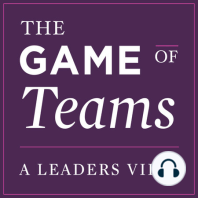54 min listen

A Conversation with Professor David Clutterbuck on the Game of Teams Podcast series
A Conversation with Professor David Clutterbuck on the Game of Teams Podcast series
ratings:
Length:
52 minutes
Released:
Jun 15, 2019
Format:
Podcast episode
Description
Professor David Clutterbuck is a scion in the field of coaching, mentoring, team coaching and research. He is one of Europe’s most prolific and well-known management writers and thinkers. He has written in excess of 70+ books and numerous articles and blogs. He is the co-founder of the European Mentoring and Coaching Council and is now a lifetime ambassador of the association. He is a visiting professor of the faculty of coaching and mentoring at Henley Business School, Sheffield Hallam, Oxford Brookes and York St. Johns Universities. I was delighted to have the opportunity to speak with him today and I hope you enjoy this episode on the Game of Teams Podcast series. This particular episode with Professor David Clutterbuck illuminates the systemic nature of teams and how teams are part of a nested system. The terrain is complex, often messy and fraught with issues like a team’s history, unspoken expectations, power dynamics, team dynamics and competing priorities and often a misguided sense of why the team is a team. Professor David Clutterbuck shared many vignettes, ideas for engagement, a framework called Perill and his explanation of a powerful question hidden in an acronym called Prairie. David spoke to his passion for teams because they are so complex and replete with learning and also his passion for writing. He has just written a new book adding to his portfolio of 70+ books called A Practitioners Handbook of Team Coaching, which is launching in the last week of April. A must read for any team Leader/member/coach or practitioner wishing to support teams be great. Noteworthy points of discussion Stand-up comedy was by far the most scary thing David has every tried but he recognises that laughter is a huge remedy and can be helpful in providing the “fizz” and “buzz” on teams He often asks of teams to tell him the most ridiculous positive thing that happened recently to connect people with their humanness and to improve the quality of conversations. Important to see teams as a part of an ecosystem and to appreciate the complexity of the system of which teams are apart Teams need to understand their history to know their future Psychological safety is very closely linked to high performance David Clutterbuck advises more time spent in upfront preparation and getting to know the team than in actual team coaching. Really important to appreciate the complexity of teams/the dynamics of interrelations not just within the team but also with their interfaces. Many reasons to engage in team coaching. Conflict, A new Leader, Project teams needing to move faster and be a real team, working out interdependencies, all kinds of transitions, learning skills/process management and how to collaborate or dialogue effectively together. Important too to get clear agreements between all parties to a team coaching engagement to understand expectations Fundamental role of Team Coach is to be redundant over time, to get to a place where the team has absorbed the coaching process. Learning is a critical dimension for teams. Top teams must be able to answer the question “Is this team adapting, evolving and changing at pace ahead of or at least abreast of pace of change around them?” A team must work with a team development plan. What is the learning the team must achieve together to cope with their environment and to get at the performance required. David Clutterbuck shared his PERILL Framework for teams. P stands for Purpose and Motivation, E stands for external relations and processes, R stands for relations, I stands for internal processes like decision making, L stands for learning and L stands for Leadership not the person but the 15 or so functions a leader needs to negotiate with the team to distribute effectively. This model is inherently the first Complex Adaptive Systems thinking framework for teams. Too often teams reach for the simple solution but David Clutterbuck explained the peril of this way of simplistic thinking. Teams needs t
Released:
Jun 15, 2019
Format:
Podcast episode
Titles in the series (98)
A Conversation with Professor Peter Hawkins on the Game of Teams Podcast series: Interview Professor Peter Hawkins by The Game of Teams